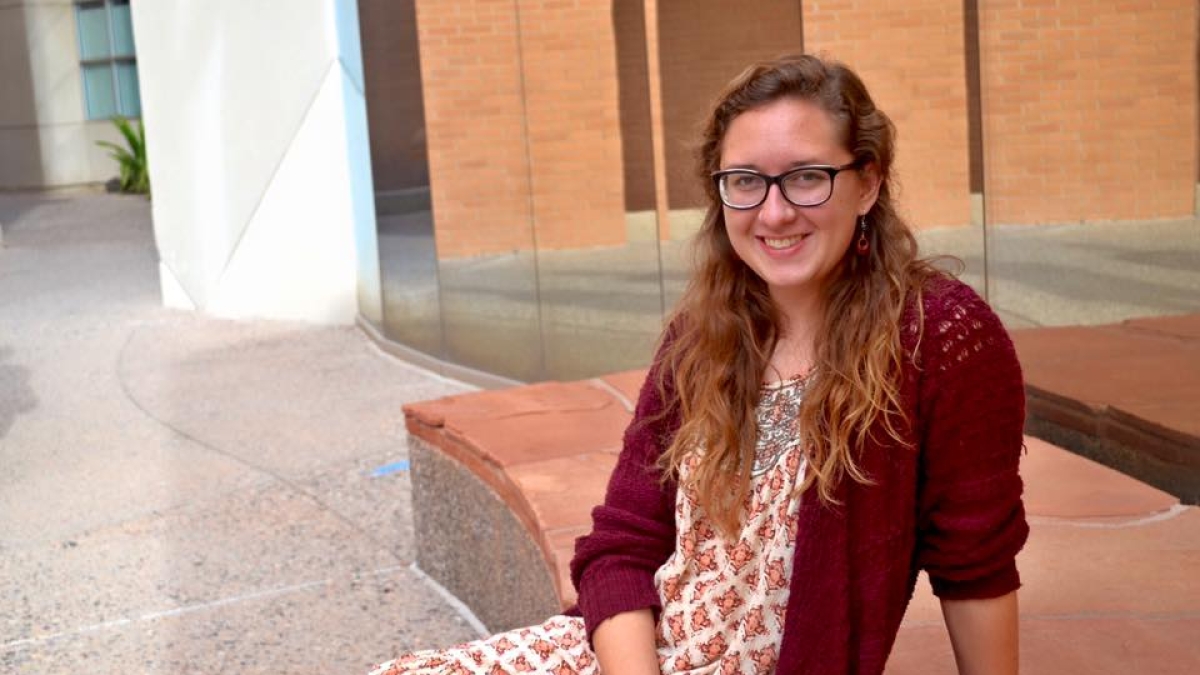Editor’s note: This is part of a series of profiles for spring 2017 commencement. See more graduates here.
Brigitte Nicoletti's interest in law was sparked in ninth grade when she joined her high school's mock-trial program. In 11th grade, she began participating as a juror and attorney in the Teen Court of Coconino County, Arizona, a diversionary and restorative justice program for juveniles.
She brought that interest to Arizona State University, where she took a class with ASU Law Professor Anne Herbert called the Global Legal Community and directed a research project that examined international, regional and national approaches to juvenile justice to design a restorative juvenile justice model for Latin American countries.
Nicoletti, who is the Barrett Honors College Spring 2017 Outstanding Graduate for Leadership and Service, also was president of the Prison Education Awareness Club and taught a weekly gender studies class to male inmates at the Arizona State Prison in Florence.
In 2015, Nicoletti received the Barrett Honors College Intercontinental Study Award, worth about $9,000. She used the award to fund a research project that she designed with the help of faculty in the Sandra Day O’Connor College of Law. The project took her on a solo trip to six countries to study approaches to the implementation of the restorative justice norms outlined by the United Nations in the Convention on the Rights of the Child. Her aim was to bring back methodologies as models for reform in the United States.
She visited Switzerland and Belgium to meet with officials at the United Nations and the International Juvenile Justice Observatory to gain a better understanding of the current status of juvenile justice theory. She also traveled to Germany, Norway, Malawi and Japan, to compare those country’s juvenile justice systems.
“I met with professors, judges, lawyers, police officers, ministers, mediators, NGO advisers and people who had been incarcerated as juveniles, trying to create a complete picture of juvenile justice practices in each country. Despite the multitude of cultural and political nuances I encountered, I came to understand that the underlying problems associated with incarceration are the same the world over. People need to be invested in a system in order for them to respect it; they have to believe that it works equally for them as it does for everyone else,” she said.
Nicoletti, who is from Flagstaff, is receiving her bachelor's in history from the College of Liberal Arts and Sciences, with minors in French, women and gender studies, and English literature. She will also graduate with honors from Barrett. Here, she answers some questions about her studies and her plans for the future.
Question: What was your “aha” moment, when you realized you wanted to study the field you majored in?
Answer: My parents instilled me with a love of history from a very young age. My dad was a high school history teacher, and my mom has had a lifelong interest in British and American history. I grew up going on trips with my parents to visit historical landmarks around the country, and later around the world.
I think the most significant moment for me occurred when I was 7. My parents had taken me to England, and we were visiting Oxford University. I remember walking up the staircase at Christ Church College, running my hand along the centuries-old bannister and thinking about all of the great people who had walked there before me (including the cast of Harry Potter). From that moment on, I knew that I wanted to know more about English history, and at ASU, I was able to realize this goal and so much more. I never will accept the argument that traveling with young children is a waste of money because “they won’t remember anything anyway.” I not only remembered my time in England, it shaped the rest of my life.
Q: What’s something you learned while at ASU — in the classroom or otherwise — that surprised you, that changed your perspective?
A: I believe the subject that most changed my perspective was the concept of intersectionality, or the ways in which intersecting aspects of our identities come together to uniquely shape our perspectives and interactions with systems of power and discrimination. I was first introduced to this concept my freshman year in my first Women and Gender Studies class. Since then, I have gone on to pursue a minor in Women and Gender Studies and to teach a class on gender studies at Florence State Prison through my work as president of the Prison Education Awareness Club. In this class, I had the opportunity to introduce my students to intersectionality, finally giving them the word for something that they had been feeling the effects of their whole lives.
Q: Why did you choose ASU?
A: I chose ASU because I wanted to have both the intimacy of a small, liberal arts education through Barrett, The Honors College, and the opportunities afforded by a large research university. I could not have chosen better. I have been able to take classes in fields I didn’t even know existed, all while creating fantastic relationships with faculty and staff who I believe will be my lifelong mentors.
Q: What’s the best piece of advice you’d give to those still in school?
A: I know that everybody says this, but my advice is to go talk to your professors! Almost every opportunity for research and employment that I have had at ASU began as a simple conversation with a professor during office hours. The majority of ASU faculty really are here because they love students and teaching, and there is a real value placed on collaboration.
Q: What was your favorite spot on campus, whether for studying, meeting friends or just thinking about life?
A: My favorite is the Secret Garden. If I have time between classes, I’ll go there to read or take a nap. It’s really nice to be able to get away from everything, and even though it is in the middle of campus, it feels like a secluded sanctuary. Coming from Flagstaff, I’ve always valued the feeling of being able to escape into nature, and the Secret Garden is my escape.
Q: What are your plans after graduation?
A: I will be attending UC Berkeley's School of Law. I hope to then be able to work in the field of international juvenile justice reform.
Q: If someone gave you $40 million to solve one problem on our planet, what would you tackle?
A: When I was in Malawi, I spoke with the former Deputy of Police there. She now runs an orphanage in the southern part of the country, where there are huge issues with drought. She told me that if there was a way to get an irrigation system going from the mountains in the center of the country where there is plenty of rainfall to the valleys in the south that have very fertile soil, it would be a boon for the entire country.
Even more importantly than providing a boost to the local economy through job creation, this would combat the disastrous food and water shortages that this region has been experiencing in recent years as a result of the changing climate. She said that there had been numerous proposals by NGOs and government agencies to build such an irrigation system, but that each time, they left without fulfilling their promises.
Clearly, such a project is manageable, and the overall economic and human benefits could transform the entire country of Malawi. All that is required is the funding and the dedication to actually see it through. As someone interested in juvenile justice reform, this irrigation project would normally be outside my area of interest, but as I spoke with the deputy, it became clear that providing economic stability to this area is the first, necessary step to implementing any lasting reform in any area. Receiving a well-rounded education from ASU gave me a profound appreciation for these kinds of novel, interdisciplinary solutions, and I hope to actually see this completed someday.
More Law, journalism and politics

ASU launches nonpartisan Institute of Politics to inspire future public service leaders
Former Republican presidential nominee and Arizona native Barry Goldwater once wrote, "We have forgotten that a society progresses only to the extent that it produces leaders that are capable of…

Annual John P. Frank Memorial Lecture enters its 26th year
Dahlia Lithwick, an MSNBC analyst and senior legal correspondent at Slate, is the featured speaker at the School of Social Transformation’s 26th annual John P. Frank Memorial Lecture on…

The politics behind picking a romantic partner
A new study reveals the role that politics play when picking out a romantic partner — particularly for older adults.“Findings show that politics are highly salient in partner selection across gender…
